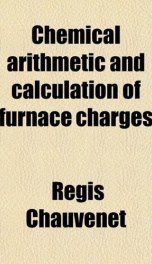chemical arithmetic and calculation of furnace charges

Purchase of this book includes free trial access to www.million-books.com where you can read more than a million books for free. This is an OCR edition with typos. Excerpt from book: CHEMICAL ARITHMETIC. SOME FUNDAMENTAL LAWS OF CHEMISTRY. Conservation of Mass.Matter is not destroyed by any chemical action; its mass remains constant, whatever its change of physical condition. Definite Proportions.In every chemical compound the constituents occur in definite unalterable proportions by weight. Multiple Proportions.When two elements unite in several proportions, and we regard fixed weights of one element, the quantities of the second element will bear a simple ratio to each other. Avogadro's Rule.The number of molecules in a unit volume of all gases is the same, temperature and pressure being equalized. Gay-Lussac's Law.When gases unite, the volumes both of the constituent parts and the product bear to each other some simple ratio. Boyle's Law.The volume of a mass of gas varies inversely as the pressure on it. Charles' Law.The volume of a gas varies directly as the absolute temperature to which it is exposed. Dulong and Petit's Law.The product of the atomic weight of an element by its specific heat is a constant, substantially the same for all the elements. Gay-Lussac's name is retained for the law of gas unition. Charles' name is used more for distinction than as a matter of history; probably Gay-Lussac made the first definite enunciation of the law. DEFINITIONS. An atom is the least mass of an element that can take part in a chemical reaction. A molecule is a particle of matter representing the limit of divisibility so far as similarity goes. ("Physical identity" limit.) (A molecule may be either simple or compound. There are probably monatomic molecules. It is not necessary to connect the idea of "indivisibility" with the chemical atom.) Atomic Weights. The proportions in which or in simple multiples of which...
Info about the book
Author:
Series:
Unknown
ASIN:
B00672FRWQ
Rating:
5/5 (7)Your rating:
0/5
Languge:
English
Users who have this book
Users who want this book
What readers are saying
What do you think? Write your own comment on this book!
write a commentif you like chemical arithmetic and calculation of furnace charges try:
Other books by this author
Do you want to exchange books? It’s EASY!
Get registered and find other users who want to give their favourite books to good hands!


